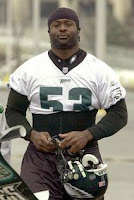Riley Cooper is back practicing with the Eagles and playing in the team's exhibition games.
Hugh Douglas is out of a job with ESPN.
So much for my theory that there are some words that a white guy simply can't say, that don't seem quite as egregious when uttered by a black man.
Cooper, of course, is the white Eagles wide receiver who was caught on video back in June at a Kenny Chesney concert in an angry outburst in which he used the N-word on a black security guard. He was fined by the Eagles, allowed a few days away to get some counseling and visit his family, and is now back to work.
Douglas, the former Eagles star defensive end, has been doing radio and TV work since retiring. But at a recent function hosted by the National Association of Black Journalists in Orlando, Fla., he allegedly was drunk and went on a racial tirade against Michael Smith, who co-hosts the ESPN show "Numbers Never Lie" with him.
Douglas dropped the N-word on Smith, who also happens to be black, as well as also referring to him as an "Uncle Tom." But that's not all. According to reports, Douglas threatened several times to physically beat up his co-host.
That apparently didn't sit well with the poobahs at ESPN.
They severed their ties with Douglas on Tuesday.
One of the things that bothered me in the conflagration that followed the Cooper fiasco was the angst of white people complaining that black people use that incredibly derogatory term all the time, from rap music lyrics, to locker rooms, to street corners. They somehow believed that formed some kind of double-standard.
My response? Yes, it does. And it doesn't matter. There is a history of abject hate and ugliness connected to that word when uttered by whites that takes on a completely different meaning.
Maybe that doesn't fly for jocks and ex-athletes. Maybe it's just another reason to realize they live in a completely different world than we do.
Riley Cooper is putting his life back together. Now Hugh Douglas is, too.
The difference is Cooper still has his job, and Douglas does not.
What does that tell me? I don't have a clue, other than we still have a long way to go in this country when discussing race.

Comments